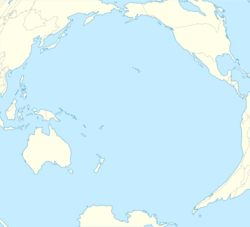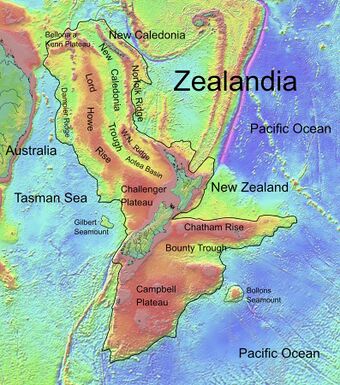Earth:Taupo Bank
| Taupo Bank | |
|---|---|
| Summit depth | 128 metres (420 ft) |
| Location | |
| Location | Just under 500 km (310 mi) to the east and slightly north of Sydney, New South Wales, Australia |
| Group | Tasmantid Seamount Chain |
| Coordinates | [ ⚑ ] : 33°10′0″S 156°10′0″E / 33.166667°S 156.166667°E |
| Geology | |
| Type | Guyot |
The Taupo Bank (also previously known as Mont Taupo,Taupo Guyot or Taupo Tablemount) is an extinct volcanic seamount of the Tasmantid Seamount Chain.
It is a basaltic volcano that erupted between 10,300,000 to 11,400,000 years ago,[1] with survey data that indicates it rises about 3,160 m (10,370 ft) above the local sea floor to a minimum depth of 128 m (420 ft).[2] The sediments deposited on top of the alkali olivine basalt[1] originate from the Late Miocene.[3] It was likely a coral-capped volcanic seamount during the Pleistocene low sea level.[4] It was described as a seamount in 1961.[5]
The Tasmantid Seamount Chain is parallel to the Lord Howe Seamount Chain. Because detailed compositional analysis elsewhere has suggested that as well as individual compositional maturation with time within an individual seamount chain there may be underlying shared mantle plume sources in such parallel chains this issue has been examined with samples from Taupo Bank. These samples share compositional analysis similarities with some of the volcanics that formed Lord Howe Island which would be consistent with a common or similar mantle plume source.[6]
The waters above it are incorporated in the Central Eastern Marine Park, an Australian marine park.[7]
References
- ↑ 1.0 1.1 Eggins, S. M.; Green, David Headley; Falloon, Trevor J. (1991). "The Tasmantid seamounts: Shallow melting and contamination of an EM1 mantle plume". Earth and Planetary Science Letters 107 (3–4): 448–462. doi:10.1016/0012-821X(91)90092-V. https://www.researchgate.net/publication/253465187.
- ↑ "GEBCO Undersea Feature Names Gazetteer". https://www.ngdc.noaa.gov/gazetteer/.
- ↑ Quilty, Patrick G. (1993). "Tasmantid and Lord Howe seamounts: biostratigraphy and palaeoceanographic significance". Alcheringa: An Australasian Journal of Palaeontology 17 (1): 27–53. doi:10.1080/03115519308619487. https://www.tandfonline.com/doi/abs/10.1080/03115519308619487.
- ↑ van der Linden, Willem JM (1970). "Morphology of the Tasman Sea floor". New Zealand Journal of Geology and Geophysics 13 (1): 282–91. doi:10.1080/00288306.1970.10428218. https://www.tandfonline.com/doi/pdf/10.1080/00288306.1970.10428218.
- ↑ Standard, J. C. (1961). "Submarine Geology of the Tasman Sea". Geological Society of America Bulletin 72 (12): 1777–1788. doi:10.1130/0016-7606(1961)72[1777:SGOTTS2.0.CO;2].
- ↑ Rogers, Angus; Flanigan, Michaela; Nebel, Oliver; Nebel-Jacobsen, Yona; Wang, Xueying; Arculus, Richard J.; Miller, Laura; Smith, Ian et al. (2023). "The isotopic origin of Lord Howe Island reveals secondary mantle plume twinning in the Tasman Sea". Chemical Geology 622 (121374). doi:10.1016/j.chemgeo.2023.121374. ISSN 0009-2541. https://www.sciencedirect.com/science/article/pii/S0009254123000748.
- ↑ "Temperate East Marine Parks Network Management Plan 2018". Parks Australia. https://parksaustralia.gov.au/marine/pub/plans/temperate-east-management-plan-2018.pdf.
 |



